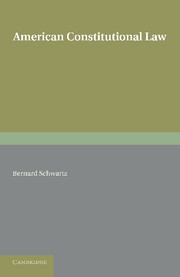Book contents
- Frontmatter
- Dedication
- Contents
- Foreword
- Preface
- PART I THE STRUCTURE
- PART II MODERN DEVELOPMENTS
- Chapter VI The New Federalism
- Chapter VII Presidential Prerogative and the Steel Seizure Case
- Chapter VIII The Changing Role of the Supreme Court
- Chapter IX The Negro and the Law
- Chapter X Civil Liberties and the 'Cold War
- Chapter XI Administrative Law
- Chapter XII The United States and the United Nations
- Appendix: Constitution of the United States of America
- Index of Cases
- General Index
Chapter VII - Presidential Prerogative and the Steel Seizure Case
from PART II - MODERN DEVELOPMENTS
Published online by Cambridge University Press: 05 June 2016
- Frontmatter
- Dedication
- Contents
- Foreword
- Preface
- PART I THE STRUCTURE
- PART II MODERN DEVELOPMENTS
- Chapter VI The New Federalism
- Chapter VII Presidential Prerogative and the Steel Seizure Case
- Chapter VIII The Changing Role of the Supreme Court
- Chapter IX The Negro and the Law
- Chapter X Civil Liberties and the 'Cold War
- Chapter XI Administrative Law
- Chapter XII The United States and the United Nations
- Appendix: Constitution of the United States of America
- Index of Cases
- General Index
Summary
‘At the first sound of a new argument over the United States Constitution and its interpretation the hearts of Americans leap with a fearful joy. The blood stirs powerfully in their veins and a new lustre brightens their eyes. Like King Harry's men before Harfleur, They stand like greyhounds in the slips, straining upon the start.’
On 8 April 1952, ‘the old bugle-note rang out, clear and thrilling, calling Americans to a fresh debate on the Constitution’. For, on that day, the Secretary of Commerce was directed by President Truman to take possession of and operate the plants and facilities of the nation's steel industry. The President had acted in order to head off a steel strike which was to have begun on 9 April. The indispensability of steel as a component of substantially all weapons and other war materials led the President to believe that the proposed work stoppage would jeopardize the national defence of the United States and that governmental seizure of the steel mills was necessary in order to assure the continued availability of steel.
But, though the President's action in ordering seizure of the steelindustry was motivated by his conception of what was necessitated by the public interest, he had acted without any statutory authorization to do what he did. And, under the American constitutional system, the question whether the President's action in such circumstances was valid was a judicial question, to be resolved ultimately by the federal Supreme Court.
To the student of comparative law, the judicial resolution of a case like the steel seizure illustrates, in a striking manner, the key position of the judiciary in the American scheme of things. It was the American Supreme Court which determined the legality of the President's action in seizing the steel industry, and its resolution of the issue was accepted without question by the other branches of the Government. It is as an outstanding example of the role of the federal judiciary in the constitutional sphere that the decision of the American courts in the steel seizure case is of primary interest. A constitution is a mere paper instrument unless the guarantees contained in it are adequately safeguarded by the courts.
- Type
- Chapter
- Information
- American Constitutional Law , pp. 187 - 206Publisher: Cambridge University PressPrint publication year: 2013



